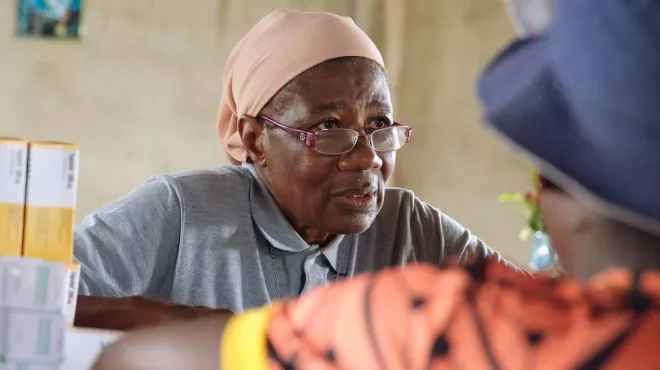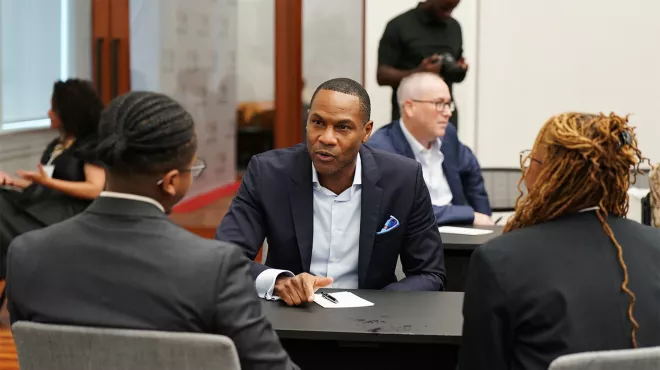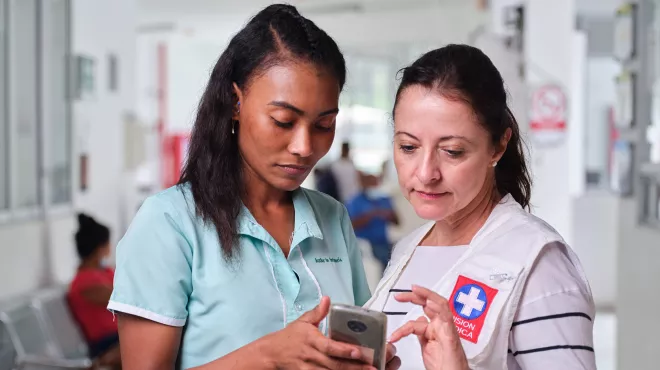When Marie-France Tschudin, President of Novartis Pharmaceuticals, was starting out as a pharmaceutical sales representative almost three decades ago, she met many patients, but she recalls one in particular. The patient was taking a medicine that Tschudin had introduced to her doctor. A year later, Tschudin received a book of short stories from the patient along with a thank you note. She had been able to write the short stories because the medicine had helped her function again.
“That story has stuck in my mind because it displays the power of what this industry can do,” says Tschudin. “We can change medical practice and we can change people’s lives in the most positive ways.”
Tschudin now sees a new way for the industry to make a difference. For a long time, pharmaceutical companies have focused on selling products. But simply selling innovative products isn’t enough in a world where health inequities are evident around the globe and manageable diseases like heart disease are causing millions of avoidable deaths and hospitalizations.
“I want to focus on what patients need,” says Tschudin. “I want to understand where healthcare systems are struggling and how we can help."
How do we support humanity, each of us as individuals but also collectively as companies and as countries by supporting human health?
In a recent conversation, Tschudin shared more about how her team is approaching improving the reach of medicines to patients.
How do you go about understanding what patients and health systems need?
We talk to them. I spoke to a patient with multiple sclerosis yesterday. She told me she felt lucky because she only had to visit four neurologists to get a diagnosis. The stories go on and on. So what’s our role? We have a responsibility to try to connect patients to reliable information and quality care. Our ultimate goal is to get people to the right interventions faster.
Do the problems go beyond diagnosis?
Absolutely. Let’s take high cholesterol as an example. It can contribute to atherosclerosis, which over time can lead to heart attacks and strokes. Over 300 million people are living with this disease worldwide. We have 30 years of evidence showing that reducing LDL cholesterol, that’s the so-called “bad” cholesterol, reduces the risk of death from heart disease. Yet approximately 75% of people have difficulty reaching medically recommended cholesterol levels. It’s not because there aren’t great medicines out there. They’re just not reaching people or people stop taking them.
Where are the gaps?
It’s often not the science, but non-medical barriers that get in the way. Even after a product has launched, just a fraction of people who would be eligible for the treatment are actually able to get it. There are so many possible reasons for this, from difficulties getting a doctor’s appointment – a problem that the pandemic has made worse – to payor or government reimbursement challenges. Even when people do get the medicine, they may have difficulty staying on it over the long haul for many reasons.
What’s at stake if these problems don’t get solved?
If high cholesterol isn’t managed, heart disease will worsen over time and risks go up. More and more of these people end up hospitalized, re-hospitalized, in secondary care or potentially dying. All of this takes a huge toll on families and individual lives. But also, this care will cost the global economy a trillion dollars by 2030. Yet 80% of these events are preventable if the condition is managed proactively.
You said we have a responsibility to help. What can a pharmaceutical company do beyond producing medicines?
We need to work more systematically to meet the needs of health systems and patients. Heart disease is an obvious place where help is needed. We’re responding with creative and collaborative approaches to connecting patients to care.
One example is a partnership with a government health system that focuses on people who have had a cardiovascular event and have high LDL cholesterol. The partnership with the National Health Service in England helps doctors to identify and appropriately treat these people with the goal of treating 300,000 people in three years.
What if an approach like this could help us prevent avoidable deaths, heart attacks, hospitalizations? Learn more here.
How is this approach different from what’s been done in the past?
In a traditional model, Novartis would be trying to convince physicians to change their behavior, one physician at a time. But when we work with health systems and emphasize access to care – reaching more patients – the focus shifts to a shared goal. It’s about helping them meet the needs of the system and the needs of patients.
It is often an incredibly local approach. In Philadelphia, for example, people’s cardiovascular health outcomes differ dramatically based on zip code. To help address these disparities, we’re collaborating with a healthcare system there to find ways to improve access to care and resources in these communities.
How is helping one country or city at a time helpful?
We need to support local healthcare systems to get there because that’s where care happens. It’s not going to be a one size fits all solution but successful examples of innovative access approaches in different places will help by creating credibility and confidence. If we get a few of these implemented, that will make it tangible and give us momentum to do more.




